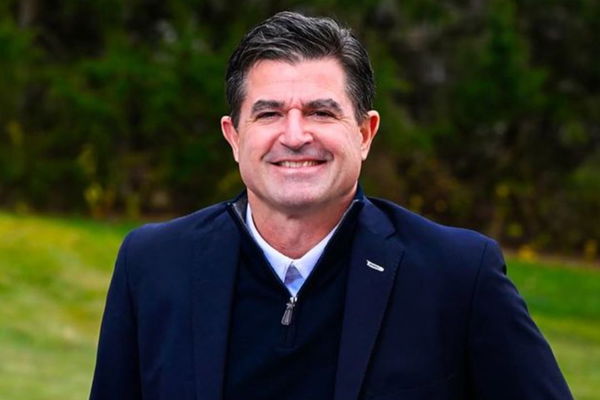
Getty
Silhouetted golfer on the tee during the 127th British Open Golf at Royal Birkdale GC in Southport 16th-19th July 1998. (Photo by David Ashdown/Getty Images)

Getty
Silhouetted golfer on the tee during the 127th British Open Golf at Royal Birkdale GC in Southport 16th-19th July 1998. (Photo by David Ashdown/Getty Images)
LIV Golf executives keep talking about bridging golf’s divide and bringing everyone together. So, when Brian Rolapp was appointed the new PGA Tour CEO, most thought it could be a moment that would bridge the two sides. After all, Scott O’Neil admitted, “Brian and I went to Harvard Business School together. Yeah, we’re friends. We go to the same Church, and so we’re friends. Yeah.” Furthermore, he described Rolapp as“great for the game of golf” and called him a“smart, high integrity, extraordinary dealmaker.”
Watch What’s Trending Now!
Now, O’Neil is catching heat from golf writers who see right through his latest comments about his friendship with PGA Tour leadership. The disconnect is becoming painfully obvious.
O’Neil’s claims about Brian Rolapp, have sparked criticism across the golf media. Moreover, the timing of these revelations raises questions about LIV’s underlying strategy for gaining mainstream acceptance.
ADVERTISEMENT

Imago
Image Credits: @scottoneil on Instagram
However, critics found the church reference particularly telling. Lynch explained, “By the time O’Neil added that he and his opposite number “go to the same church” (as in Latter-day Saints, not as in the same structure), the sweaty desperation for relevance was all too apparent. Which is wholly on brand for LIV these days.”
Most damaging was O’Neil’s assertion that they would “catch up at the Open.” Unfortunately, Rolapp isn’t actually attending The Open Championship at Royal Portrush. This inaccuracy only reinforced perceptions that O’Neil was manufacturing connections that don’t exist in reality. Nevertheless, their documented friendship includes a 2021 social media exchange over O’Neil’s book.
ADVERTISEMENT
Lynch’s critique compared O’Neil to his predecessor, Greg Norman, noting both try to create organizational narratives that don’t match reality. This pattern has become increasingly apparent as LIV seeks mainstream acceptance through manufactured moments rather than authentic achievements.
Top Stories
Furious Golf Fans Sign Petition Demanding Suspended PGA Tour Pro’s Reinstatement

Jon Rahm Has the Last Laugh as DP World Tour Decides on LIV Golf Fines – Insider

Jordan Spieth Feels Envious of PGA Tour Pro 6 Years His Junior, All Because of a Simple Golf Trait

Disqualified PGA Tour Pro’s True Character Clear as He Opens Up on Using Banned Item at Torrey Pines

Nelly Korda & Co. Stopped From Teeing Up as $2.1M Tournament Faces Unexpected Disruption

ADVERTISEMENT
LIV Golf’s Broader Legitimacy Struggles Continue
O’Neil’s comments reflect LIV’s ongoing battle for mainstream acceptance within professional golf. Despite three years of operation, the tour continues struggling to establish credibility beyond its Saudi financial backing. Consequently, each public statement is subjected to intense scrutiny for signs of manufactured relevance.
The tour’s recent OWGR resubmission exemplifies this pattern perfectly. LIV offered no specific material changes to address previous non-compliance issues. Instead, they demanded that the rules be rewritten quickly. Their statement called for a “a more global, all-encompassing, and accurate ranking system,” without addressing the fundamental structural problems.
This approach extends beyond rankings to commercial announcements. Last week’s HSBC deal announcement contained no financial details or specific duration beyond “multi-year.” Meanwhile, the press release boasted about “potential reach of over 875 million households” without providing actual viewership data.
ADVERTISEMENT
Even player contract situations become performative exercises designed to create narratives of growth and development. Dustin Johnson‘s expected re-signing is likely to generate fanfare, despite his apparent lack of motivation. These moves aim to suggest lengthy runways ahead without economic fundamentals supporting such optimism.
Research shows LIV faces persistent legitimacy challenges compared to established tours. Academic analysis describes the rivalry as fundamentally about “legitimacy work” where organizations frame messages to influence public perceptions. Unfortunately for LIV, their messaging consistently falls short of creating authentic credibility.
The tour’s television distribution deals further highlight these struggles. After failing to negotiate with major networks, they settled for revenue-sharing arrangements with smaller broadcasters. These deals lack the prestige and reach necessary for true mainstream acceptance.
ADVERTISEMENT
Jon Rahm remains skeptical about whether personal relationships between CEOs will suddenly lead to increased merger talks. “There’s also people behind them and higher up than them that would ultimately make the decision,” he noted pragmatically.
O’Neil’s desperate name-dropping reveals LIV’s fundamental challenge: no amount of manufactured connections can substitute for genuine sporting legitimacy. The tour continues to struggle to establish worth through competition rather than commentary, and such efforts will likely continue to appear exactly as they are—desperate attempts at relevance from an organization still searching for its place in professional golf.
ADVERTISEMENT
ADVERTISEMENT
ADVERTISEMENT
ADVERTISEMENT
